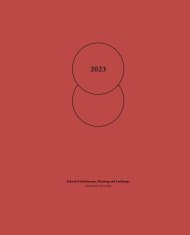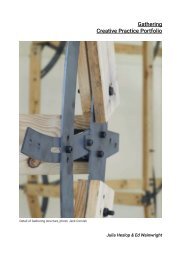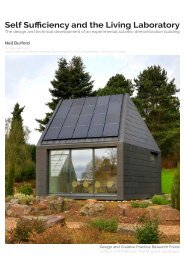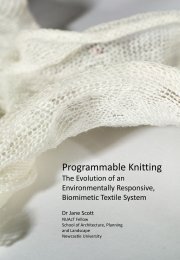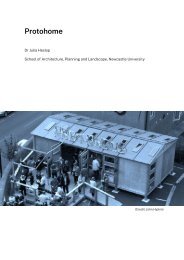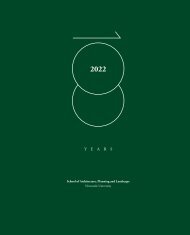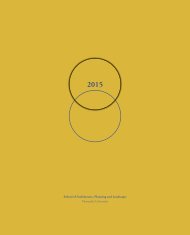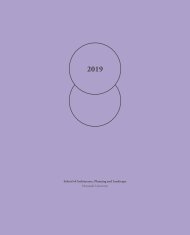Create successful ePaper yourself
Turn your PDF publications into a flip-book with our unique Google optimized e-Paper software.
Reclaiming ‘people power’ while shielding civil society
Helen Jarvis, Reader in Social Geography
School of Geography, Politics and Sociology, Newcastle University
Findhorn Ecovillage ‘experience week’ 2015: ‘group-work’ driving
new forms of communal living. Photo: Helen Jarvis
Relationships of ‘people power’ are at the heart of
my research and teaching, variously in ‘groupwork’
driving new forms of communal living,
including place-based interventions to combat
loneliness, student activism and citizen-led
movements for social and ecological justice. This
resonates with Patsy Healey’s civil society activism,
emphasising the ‘social architecture’ of
relationships and solidarities.
The message appears simple: efforts to cultivate
relationships of mutual trust and common purpose
strengthen civic influence in local concerns. But
the reality is more complex. Civil society
encompasses multiple facets of public and
associational life: some facets are more
progressive, participatory and transformative than
others.
On the one hand, it is useful to recognise a
continuum of civic purpose. This way we can
support the ethic of care that underpins voluntary
and community advocacy and service (cycling
campaigns, food banks) without dodging the
imperative to organise – to question why any
welfare state should rely on food banks to feed
hungry families. In community organising, the
benefits of ‘charity’ are typically challenged by the
idea that organising together means not doing for
others what they can do for themselves.
10
A relational approach goes further, to challenge
the atomistic view of individuals tackling local
problems on a voluntary basis (the ‘self’ of statesponsored
‘self-organising’ and ‘self-help’),
emphasising instead intentional associations of
‘do-it-together’ collaboration. Viewed this way,
public life will flourish if we open up multiple
spaces (social and material) for people to seek
common ground with others.
On the other hand, there are facets of public and
associational life that routinely harbour incivility,
hostility, isolation and exclusion. In 2018, Julia
Unwin led an independent inquiry that described
civil society as ‘breaking apart’ and ‘individualized’,
deeply divided by the EU referendum and toxic
public debate. She called for more power to be
put in the hands of people and communities,
preventing an ‘us and them’ future by helping
more people to design, control and own the
things they care about.
A global pandemic has now disrupted all sectors
of life. We are simultaneously witnessing ‘empty
streets filled with the love and care that we have
for each other’ (quoting the Queen’s televised
message to the nation), with civil society richly
served by volunteers organising mutual aid
groups online. At the same time, Coronavirus has
unleashed a ‘tsunami of hate and xenophobia’.
The dark side of ‘social distancing’ (misguided
government term for physical distancing) is
prejudice, harassment and the targeting of
vulnerable groups. The pandemic has exposed
and exacerbated deep social inequalities. While
Covid-19 is the most intense collective experience
since the Second World War, this shared civic
experience is atomised, rather than mobilized: it
consequently threatens to dismantle the social
architecture of ‘people-power’.



